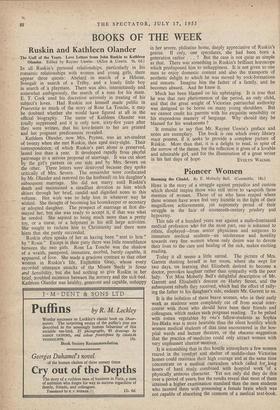BOOKS OF THE WEEK
Ruskin and Kathleen Olander
The Gulf of the Years. Love Letters from John Ruskin to Kathleen Olander. Edited by Rayner Unwin. (Allen & Unwin. 9s. 6d.)
IN all Ruskin's personal relationships, particularly in his romantic relationships with women and young girls, there appear three quests: Abelard in search of a Heloise, Svengali in search of a Trilby, and a lonely little boy in search of a playmate. There was also, intermittently and somewhat ambiguously, the search of a man for his mate. E. T. Cook used his discretion seriously in treating of his subject's loves. Had Ruskin not himself made public in Praeterita so much of the story of Rose La Touche, it may be doubted whether she would have figured at all in the official biography. The name of Kathleen Olander was totally suppressed and it is only now, sixty-five years after they were written, that his love-letters to her are printed and her poignant predicament revealed.
Kathleen Olander, now Mrs. Prynne, was an art-student of twenty when she met Ruskin, then aged sixty-eight. Their correspondence, of which Ruskin's part alone is preserved, lasted less than a year. It developed rapidly from playful patronage to a serious proposal of marriage. It was cut short by the girl's parents on one side and by Mrs. Severn on the other. Three letters were destroyed because they spoke critically of Mrs. Severn. The remainder were confiscated by Mr. Olander and restored (to the husband) on his daughter's subsequent marriage. She did not marry until Ruskin's death and maintained a steadfast devotion to him which shines through her brief, candid and dignified notes to this volume. Her wish was to help him in whatever way he wished. She thought of becoming his housekeeper or secretary or adopted daughter. The prospect of marriage at first dis- mayed her, but she was ready to accept it, if that was what he needed. She aspired to being much more than a pretty toy, or a nurse, or a helpmeet in his still large activities. She sought to reclaim him to Christianity and there were hints that she partly succeeded. Ruskin often speaks of her as having been " sent to him " by " Rosie." Except in their piety there was little resemblance between the two girls. Rose La Touche was the shadow of a wraith, pampered, immature, morbid, barely capable, it appeared, of love. She made a gracious contrast to that other woman in Ruskin's life, Euphemia Gray, whose every recorded utterance smacks of the Misses Steele in Sense and Sensibility, but she had nothing to give Ruskin in her brief, troubled existence between the nursery and the sick-bed. Kathleen Olander was healthy, generous and capable, unhappy in her severe, philistine home, deeply appreciative of Ruskin's genius. If only, one speculates, she had been born a generation earlier . . . ? But the case is not quite as simple as that. There was something in Ruskin's brilliant horoscope which predisposed him to unhappiness. It is not given to one man to enjoy domestic content and also the transports of aesthetic delight to which he was moved by rock-formations and sunsets. Imagine him the father of a family, and he becomes absurd. And he knew it.
Much has been blamed on his upbringing. It is true that he was that rare phenomenon of the period, an only child, and that the great weight of Victorian patriarchal authority was designed to be borne on many young shoulders. But we cannot credit his parents with his exquisite sensibility or his stupendous mastery of language. Why should they be blamed for his weaknesses ?
It remains to say that Mr. Rayner Unwin's preface and notes are exemplary. The book is one which every library must possess, if it seeks to provide a complete picture of Ruskin. More than that, it is a delight to read, in spite of the sorrow of the theme, for the reflection it gives of a lovable and admirable girl, and for the illumination of a great writer


























 Previous page
Previous page